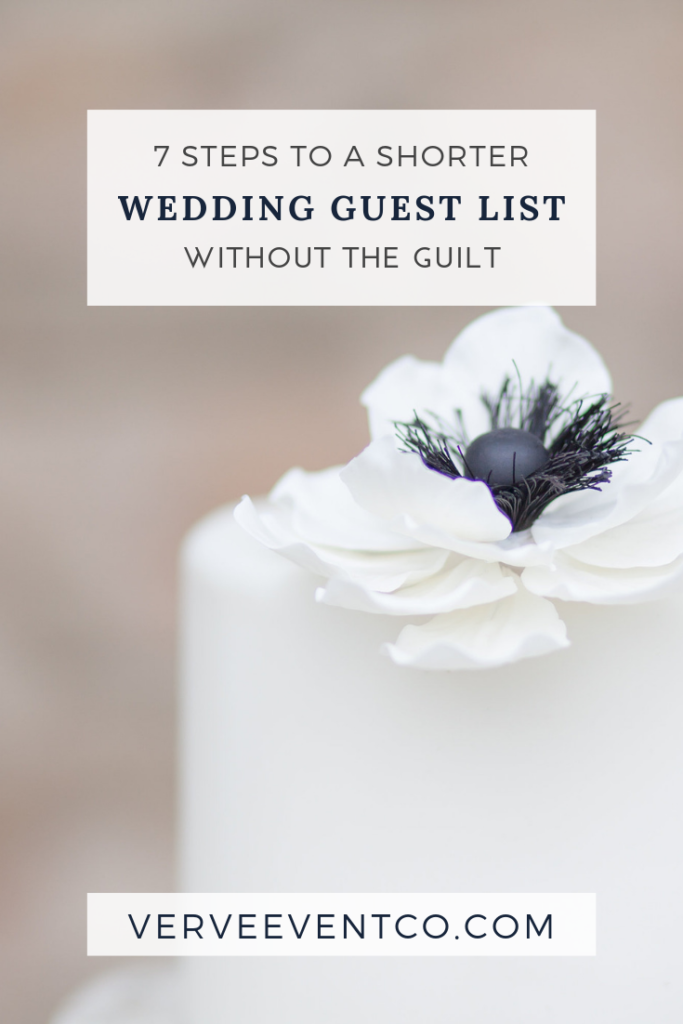As social-distancing measures and uncertainty for what next year will bring, you may be wondering how to keep your wedding guest list smaller or how to have an intimate wedding or how to have a small wedding? But it can be hard to narrow it down. Are you worried about how to cut down your wedding guest list without offending someone? or are you worried that you have too many guests? You're not alone. When I got married, we chose a smaller venue so we could have a more intimate wedding (108 guests total), but refining the list was tough work.
I invited my current boss whom I thought I was pretty close to. I ended up leaving that position soon after we became engaged. She came to my wedding, but I wondered if she felt that attending my wedding was a burden or an unwanted obligation. To this day, I still wonder if I should have saved that seat for someone else.
So, how do you plan a wedding guest list?
The Washingtonian wrote, “Instead of inviting everyone they know, couples are making their wedding guest list count and inviting only their top tier for a close-knit soiree that’s more personal, affordable and less stressful to plan.” Martha Stewart Weddings also wrote about the rise of the “micro wedding” here.
Trimming the guest list to a number that works for both of you is an unhappy chore but all engaged couples must do it. In this post, I'm going to help you decide who you should invite and who you can let go of without feeling guilt or remorse. You will feel better cutting down your guest list so that at your wedding, you can spend time with the people that you care about most.
Pin this so you can come back to it later!

Need help organizing your wedding to-do's? Get the Ultimate Wedding Planning Checklist.
1) Relatives
The size of your wedding determines how far out the family tree you venture. Immediate family is almost always a given. But for cousins and distant relatives, I recommend you draw a line and stick to it. For example, invite first cousins only; no second cousins. Invite family you see every year, or only adult first cousins but no children. It is easier to feel confident in your choices if you are consistent where you draw the line. The only time you can bend this rule is when you are talking about both your families. If you invite your second cousins, it doesn't mean your partner needs to if they never see them but you see yours every year. Consider your individual family situations instead of comparing your family and your partner's. Feeling comfortable you invited just enough people will help you trim your guest list to a manageable number.
2) Friends
Common questions couples ask are, “Do I need to invite all his [insert general friend group here]? He hasn't seen them in years.” For friends, ask yourselves, “Have we had dinner with them in the last year? Can we see ourselves going out to dinner with them in the year after our wedding? Are we certain we will be close in five years?” If you were close before but have lost touch, put them on your B list. Focus on the quality of time with your guests not the number of guests.
3) Trades
Do you feel obligated to invite someone to your wedding because they invited you to theirs? See Rule #2 above about Friends. If you received an invite to their wedding, it doesn't mean you have to return the invitation. This is your wedding. Your priorities and resources are different. If they get upset, they weren't as good a friend as you thought. However, be sensitive if you have mutual friends. Make sure the invited guests are aware of the situation and know who isn't invited. Spare both parties awkward conversations down the road.
4) The Office
Like the “hard line” rule, be consistent when it comes to inviting coworkers to keep it an intimate wedding. Either invite your whole department or no one at all. (Tip: limit your discussion about the wedding at work so coworkers don't feel invested.) The exception is if you hang out with a coworker outside of work. If you go to brunch or dinner with this friend, then they're a friend and the coworker rule does not apply.
The sticky part about this is whether to invite your boss. If your boss is someone you work with on a daily basis and see often, they might feel slighted if you do not invite them. But if you are planning an intimate affair, your boss will appreciate the pass. They don't have to make small talk all night with someone they just met.
5) The +1
A great way to trim your guest list is the plus-one. Whether to allow unmarried guests to bring a guest is an issue most couples agonize over. On one hand, you don't want to risk your friend feeling left out if they only know you and (maybe) your fiancé. However, writing “and guest” feels a bit cold, not to mention you could be spending a lot of money on a stranger. In this case, my “stick with your line” rule applies again. Make sure you are consistent with who receives a plus-one and who does not. If you choose not to give most guests a plus-one, give them special attention during seating. Seat them with someone that will engage with them and make them feel welcome. If a friend or relative is engaged or they have a long-term or live-in partner, you should invite them as well.
RELATED: How to Put Together Your Wedding Guest List
6) Children
It's pretty common to have a kid-free wedding for a number of reasons. A great way to trim your guest list is to exclude the kids. If you do this, make sure the invitation clearly indicates who you are inviting. As with the situations above, make a rule and keep to it. For example, only the children in the wedding party, or children over 13. In this last case, if a guest has a 15-year-old and a 12-year-old, write the name of the older child on the inner envelope.
After you mail the invitations, call ahead so there are no surprises. Say something like, “We mailed our invitations and hope you can join us. We are having an intimate wedding and are only having children of (explain your rule here) attend. We want you to be with us, so I wanted you to have ample time to arrange for a sitter.” If guests are not local, provide a list of babysitters so it's easier for your guests to attend. The gesture will go a long way.
7) The Former Friend
What happens if you send a save-the-date to someone and you have a falling out? It's a pretty big deal to tell someone about your wedding and then change your mind. Before you take them off your list, consider the message you want to send. If you don't invite them, you are saying, “Peace out. Friendship over.” If you invite them, you are taking the higher road and leaving the decision to them.
RELATED: You're Engaged! The First 4 Steps of Wedding Planning
Conclusion
Friends, your wedding is such an important day. I want to make sure you spend it with the people you care for and want to connect with. Plus it's expensive to have a wedding! If you were on the fence about inviting someone, I hope this gave you clarity and takes away the guilt from enjoying your intimate, small wedding.
Happy planning!




comments +